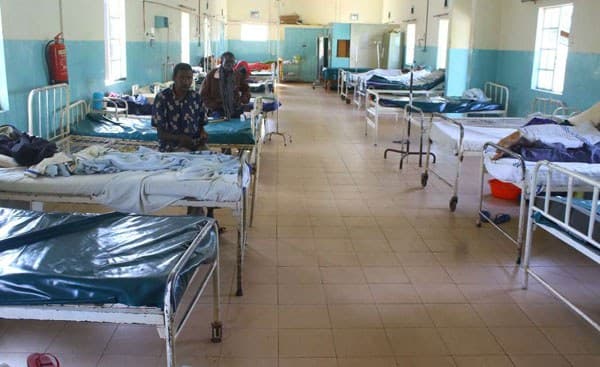We're loading the full news article for you. This includes the article content, images, author information, and related articles.
A Nairobi woman remains detained at a private hospital over an outstanding medical bill, highlighting the persistent challenge of patient detention in Kenya despite legal prohibitions and a struggling healthcare system.

Margaret Kegenga, a 46-year-old Nairobi resident, has been held at Balozi Hospital in South B for 22 days over an unpaid medical bill of Sh78,200. This incident, reported on Wednesday, October 15, 2025, underscores a recurring issue in Kenya's healthcare sector where patients are unlawfully detained for inability to settle medical expenses, despite High Court rulings against such practices.
Ms. Kegenga's predicament began after she was discharged on Friday, September 27, 2025, with a total bill of Sh156,000. Her Social Health Insurance Fund (SHIF) cover paid Sh44,800, leaving a balance that the hospital insists must be cleared to pay specialists.
Patient detention over unpaid bills is a long-standing issue in Kenya. The High Court has repeatedly ruled against this practice, affirming that detaining a patient for debt recovery is a violation of their constitutional rights to liberty and human dignity. For instance, in 2018, Lady Justice Wilfrida Okwany declared that such detentions are illegal and that hospitals should pursue other lawful means of debt recovery, such as civil suits. An Associated Press investigation in 2018 found evidence of hospital imprisonments in over 30 countries worldwide, including Kenya, where patients were held with armed guards, locked doors, and even chains.
The issue is further compounded by the high cost of healthcare in Kenya. The cost of healthcare increased by 3.3 percent between January 2024 and January 2025, according to the Kenya National Bureau of Statistics (KNBS). Many Kenyans face significant out-of-pocket expenses, with approximately Sh150 billion spent annually on direct healthcare payments. Only about one in four Kenyans has some form of health insurance coverage.
Kenya's Constitution (2010), specifically Article 43 (1) (a), guarantees every person the right to the highest attainable standard of health, including healthcare services. The Health Act, 2017, further stipulates that every person has a right to emergency treatment regardless of their ability to pay, and failure to provide such treatment is an offense. The Kenya National Patient's Rights Charter, 2013, also outlines various patient rights, including access to healthcare, emergency treatment, and being treated with respect and dignity.
Despite these legal frameworks, the practice of patient detention persists. There have been legislative efforts to criminalise the detention of patients and bodies over unpaid bills. The Health Amendment Bill 2023, sponsored by Kirinyaga Woman Representative Njeri Maina, proposes a fine of Sh1 million for health facilities, both private and public, that detain patients or bodies. This bill, which passed its first reading in Parliament, also seeks to make it illegal for public hospitals to demand upfront payments for emergency treatment.
Patients like Margaret Kegenga represent countless Kenyans caught in this cycle. Her hope in the Social Health Authority (SHA) and its Social Health Insurance Fund (SHIF) was dashed when the fund only covered a portion of her bill. This highlights challenges in the implementation of the new social health scheme, which aims to alleviate financial burdens but has faced hurdles, including a High Court declaration in July 2024 that the Social Health Insurance Act was unconstitutional due to inadequate public participation.
Healthcare providers, while acknowledging the illegality of detention, often cite the need to recover costs to pay specialists and maintain operations. However, human rights advocates, including Amnesty Kenya, argue that patient detention violates fundamental rights and negatively impacts mental health and increases the risk of hospital-acquired infections.
The detention of patients not only infringes on their rights but also exacerbates the already strained healthcare system. It can lead to prolonged suffering, psychological trauma, and even death, particularly for vulnerable individuals. The practice also erodes public trust in healthcare providers and the government's commitment to universal health coverage.
Furthermore, the ongoing industrial action in Nairobi and Kiambu counties has led to Kenyatta National Hospital (KNH) being overwhelmed by a sharp influx of critically ill patients, operating at more than twice its normal capacity in some departments. This situation further strains resources and highlights the fragility of the healthcare system when county facilities are not fully operational.
While the illegality of patient detention is clear, the lack of consistent enforcement and alternative debt recovery mechanisms for hospitals remains a challenge. The effectiveness of the proposed Health Amendment Bill 2023 in deterring this practice and providing sustainable solutions for both patients and healthcare providers is yet to be seen. Additionally, the full impact of the Social Health Insurance Fund (SHIF) rollout and its ability to truly protect Kenyans from catastrophic health expenditures is still unfolding.
The public will be keenly watching the progress of the Health Amendment Bill 2023 in Parliament and its eventual implementation. The Kenya Medical Practitioners and Dentists Council (KMPDC) continues to conduct inspections and close non-compliant health facilities, with 158 facilities in Nairobi recently shut down due to unlicensed operations and poor standards. This ongoing oversight is crucial for patient safety and quality of care. The long-term effectiveness of the Social Health Insurance Fund (SHIF) in providing equitable and affordable healthcare will also be a critical area to monitor.
Keep the conversation in one place—threads here stay linked to the story and in the forums.
Sign in to start a discussion
Start a conversation about this story and keep it linked here.
Other hot threads
E-sports and Gaming Community in Kenya
Active 9 months ago
The Role of Technology in Modern Agriculture (AgriTech)
Active 9 months ago
Popular Recreational Activities Across Counties
Active 9 months ago
Investing in Youth Sports Development Programs
Active 9 months ago
Key figures and persons of interest featured in this article